Menu
Thursday, 23 June 2022
ASEAN Centre for Energy (ACE) and Energy Foundation China (EFC) have convened a webinar to launch the latest joint report entitled “Variable Renewable Energy, Smart Microgrid, and Electric Vehicle Integration in Southeast Asia” to the public. The event was moderated by Ms. Rika Safrina, a Technical Officer of Modelling and Policy Planning (MPP) at ACE. Opened by Dr. Dong Yue, Research Fellow of EFC, and Dr. Ambiyah Abdullah, MPP Senior Officer of ACE, the webinar was held on June 23, 2022, in Zoom conferences mode, presenting three experts on the topic.
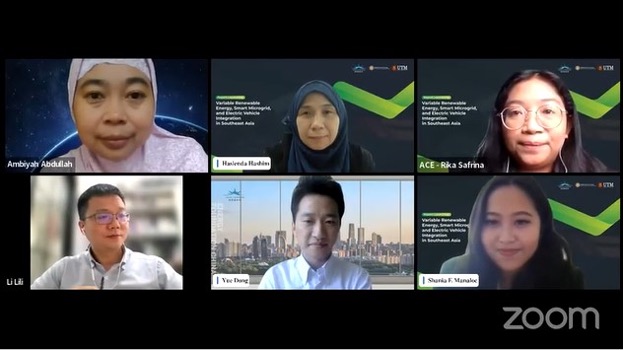
During the first session, one of the report’s authors, Prof. Ir. Dr. Haslenda Hashim from Universiti Teknologi Malaysia (UTM), presented the main findings. She mentioned the growth in electric vehicle (EV) deployment in ASEAN was growing significantly, following the direction and targets set in the ASEAN Plan of Action for Energy Cooperation (APAEC) 2021-2025. However, there are issues concerning EVs acquisitions, primarily about costs. Using General Algebraic Modeling System (GAMS), the study tried to simulate the optimal scenario for grid integration with variable renewable energy (VRE, i.e., solar and wind), EV, and smart microgrid, including the scales, charging schedules, and vehicle-to-grid (V2G) profiles. The findings show that EVs have a large enough battery capacity for peak curtailment of the grid-connected microgrid. However, for islanded microgrid cases, vehicle batteries cannot fully replace the requirement of energy storage due to the versatility of VRE. Thus, the standalone battery energy storage system is still required. Prof. Haslenda also explained the V2G concept and potential financial framework with competitive tariffs. V2G can reduce the system costs, because the solar system size will be reduced.
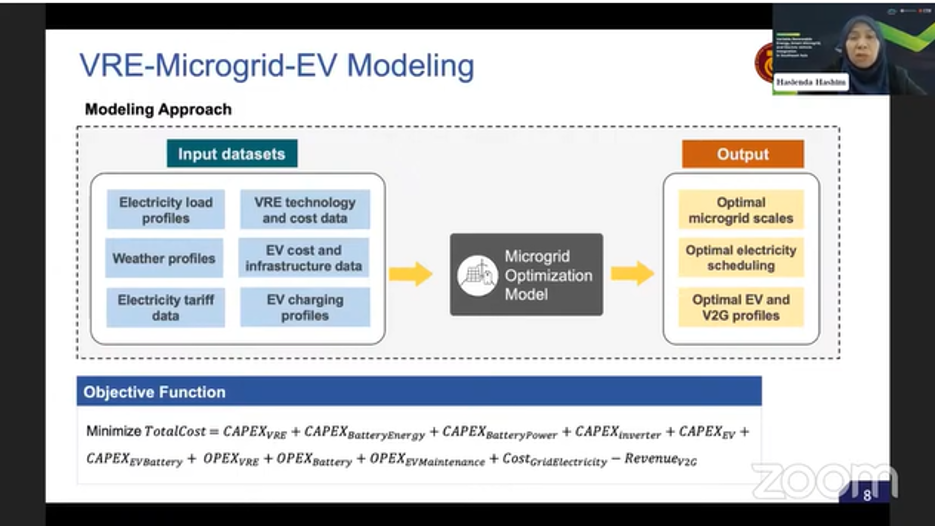 The second expert was Dr. Lili Li from Sichuan Energy Internet Research Institute at Tsinghua University, China. Dr. Li showed his research findings on the “Vehicle Grid Integration (VGI) Target and Roadmap in China.” In 2021, the EV sales in China reached more than 3.1 million, increasing by 150% with 12.4% market penetration. These conditions were supported by China’s VGI policies at the local and central levels. Based on the study’s simulation, applying the Time of Use (ToU) price and V2G could reduce the impact of EV on the system peaking load. Therefore, regulations on Smart Charging and fully promotion of ToU price for private charging are necessary. He then suggested three steps roadmap of VGI in China, which could also potentially be implemented by the ASEAN member states (AMS), including (1) preparation and pilot stage in 2021-2025, (2) national strategy around 2025, and (3) rapid promotion in the local level (2026-2030).
The second expert was Dr. Lili Li from Sichuan Energy Internet Research Institute at Tsinghua University, China. Dr. Li showed his research findings on the “Vehicle Grid Integration (VGI) Target and Roadmap in China.” In 2021, the EV sales in China reached more than 3.1 million, increasing by 150% with 12.4% market penetration. These conditions were supported by China’s VGI policies at the local and central levels. Based on the study’s simulation, applying the Time of Use (ToU) price and V2G could reduce the impact of EV on the system peaking load. Therefore, regulations on Smart Charging and fully promotion of ToU price for private charging are necessary. He then suggested three steps roadmap of VGI in China, which could also potentially be implemented by the ASEAN member states (AMS), including (1) preparation and pilot stage in 2021-2025, (2) national strategy around 2025, and (3) rapid promotion in the local level (2026-2030).
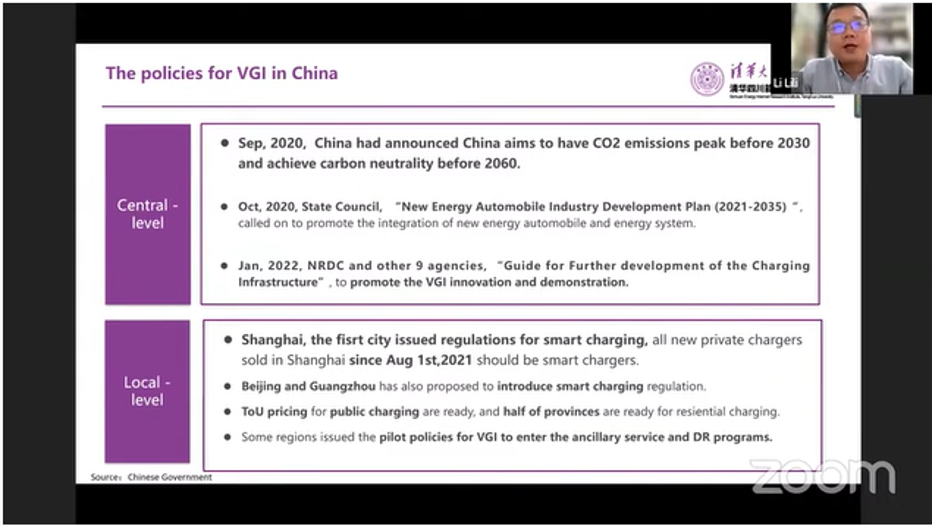 Next, as the third speaker, Ms. Shania Esmeralda Manaloe, Associate Officer of the APAEC Department at ACE, presented “The Updates on Electric Vehicles in the ASEAN region.” In 2017, the transport sector ranked as the second-highest energy-consuming sector in the region, with 26% of Total Final Energy Consumption (TFEC). It was also responsible for 70% of oil demand and 23% of the region’s greenhouse gas emissions in the same year. With no policy intervention, by 2040, the transport sector share in the TFEC is expected to increase to 37.1%, with 76% of oil demand. All AMS have established their national energy efficiency and conservation targets, with most also stating specific transportation sector policies. EV adoption is one of the approaches, along with biofuel, public transport, and fuel economy. However, AMS faces challenges in supporting policies and regulations, infrastructure availability, and building EV battery recycling systems. With the transport sector still relying heavily on oil and ASEAN’s oil production continuously declining since 2016, EVs will ensure greater energy security and transition.
Next, as the third speaker, Ms. Shania Esmeralda Manaloe, Associate Officer of the APAEC Department at ACE, presented “The Updates on Electric Vehicles in the ASEAN region.” In 2017, the transport sector ranked as the second-highest energy-consuming sector in the region, with 26% of Total Final Energy Consumption (TFEC). It was also responsible for 70% of oil demand and 23% of the region’s greenhouse gas emissions in the same year. With no policy intervention, by 2040, the transport sector share in the TFEC is expected to increase to 37.1%, with 76% of oil demand. All AMS have established their national energy efficiency and conservation targets, with most also stating specific transportation sector policies. EV adoption is one of the approaches, along with biofuel, public transport, and fuel economy. However, AMS faces challenges in supporting policies and regulations, infrastructure availability, and building EV battery recycling systems. With the transport sector still relying heavily on oil and ASEAN’s oil production continuously declining since 2016, EVs will ensure greater energy security and transition.
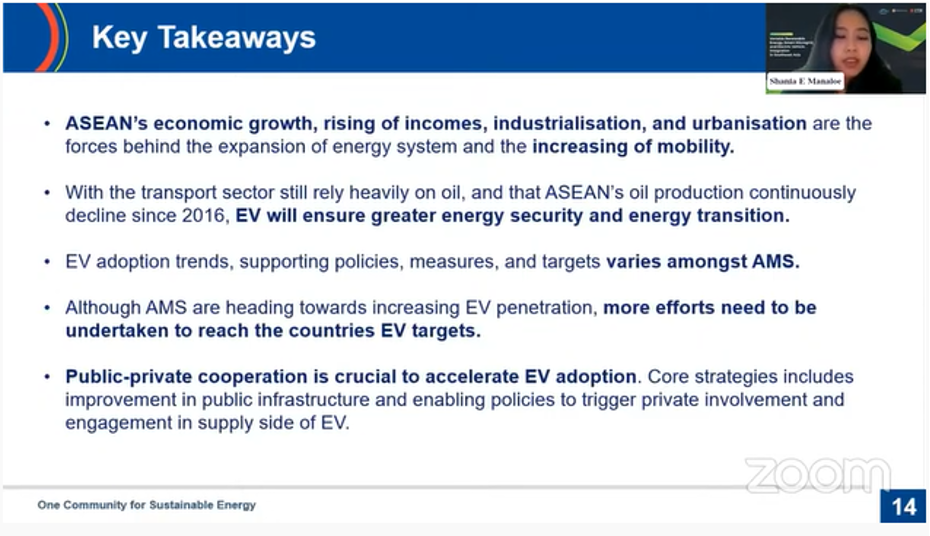 To learn more about this topic:
To learn more about this topic:
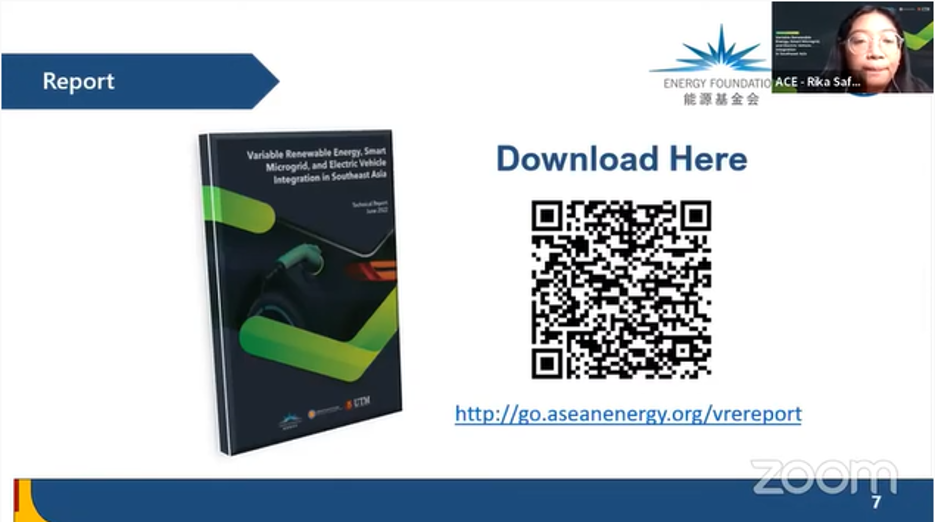
(DRY / RS)
